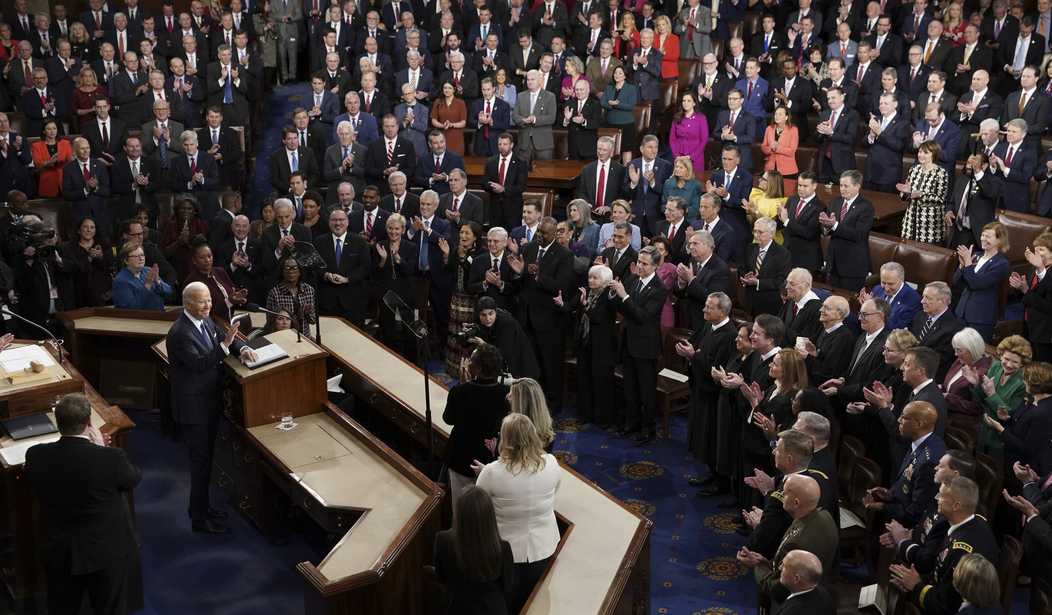A bipartisan group of 64 lawmakers known as the Problem Solvers Caucus has jumped into the debt ceiling war looking to move the stalled negotiations between Joe Biden and Kevin McCarthy along.
It’s not going to be easy. The Democrats are completely united in seeking a “clean” debt ceiling bill with no budget cuts or other provisions. Republicans are going to offer a bill with budget cuts but have yet to coalesce behind a specific set of proposals.
The Problem Solvers Caucus is proposing a short-term increase in the debt ceiling through the end of the year. This would be done in conjunction with negotiating a “sustainable” budget as well as the creation of a “fiscal commission” to find a way to stabilize long-term debt and the deficit.
Looks great on paper.
Our bipartisan Framework will suspend the debt ceiling for six months to allow for the normal budget and appropriations process to work its course this fall and to negotiate deficit stabilization proposals in discretionary spending in the mid-term. We also support Congress appointing an independent fiscal Commission which can consider every means to address ballooning debt and deficit and put the country on a sustainable path. The Commission will include experts and appointees from both sides. The Commission report will be due by December 31, 2024, and will have discretion to recommend
savings, revenues, and expenses. It will be subject to a required up or down vote by Congress by February 2025.
The U.S. will reach the limit of its borrowing authority sometime in June. That means Congress has less than two months to reach an agreement, or the U.S. will default. A drowning man is likely to reach for the nearest life preserver, so we shouldn’t dismiss this proposal out of hand. Some of what the Problem Solvers Caucus is proposing may end up in a debt limit bill, although most of it is objectionable to one or the other side.
The prevailing opinion of economists is that the immediate effects of allowing the borrowing authority of the U.S. to expire would not be catastrophic, but eventually, the tax money coming in will fail to meet the spending needs of several programs leading to federal layoffs and a loss of confidence in the U.S. government. In fact, the real damage that would be done to the economy is a matter of perception. Stocks would plunge, interest rates would spike, and the “full faith and credit” of the U.S. would be eventually lost.
Most economists strongly suggest that we not tempt fate to discover what exactly would happen with a default. But what happens if threatening default is the only way to get the Democrats to cut the budget at all?
For them, every dollar is sacrosanct — a promise to one favored interest group or another. They’d have a mutiny on their hands if they tried to cut anything except defense spending.
Texas Democrat Rep. Henry Cuellar is saying the Problem Solvers Caucus won’t intervene in the current negotiations. Their proposals will serve as a backstop if all else fails.
“First we’ll give our leadership — Hakeem [Jeffries], the president — space so they can negotiate,” Cuellar said. “Right now they’re saying, ‘No, no, no. Clean bill.’ The Republicans are saying something else. So we’ll give them a little space, but we’ve got something ready to go.”
Nebraska GOP Rep. Don Bacon, another member of the Caucus, is hoping Biden will agree to at least some cuts but if not, he hopes Biden could be persuaded to support the fiscal commission.
“At some point, we’ve got to negotiate,” Bacon said. “We’re not going to just blindly just raise the debt ceiling when the president himself has opposed it three times when he was a senator.”
The centrists also want to reform the rules underlying the budget process to ensure all spending bills move by “regular order” through the various committees, allowing the time for a hearty debate and individual votes on each appropriations measure, in lieu of the giant omnibus packages that have become routine.
The group is also calling for an annual report, conducted by the U.S. comptroller general, on “the fiscal state of the nation,” and a second “mid-year report,” submitted by the president, on the national budget.
Some of what the centrists are proposing makes sense — if the two parties weren’t engaged in a war to the death on everything else. It’s the sort of proposal that might have had a chance in a previous era when the partisan conflict was almost civilized and there was more collegiality in Congress.
Today, they’re already sharpening the axes to make the chamber floor a slaughterhouse.










